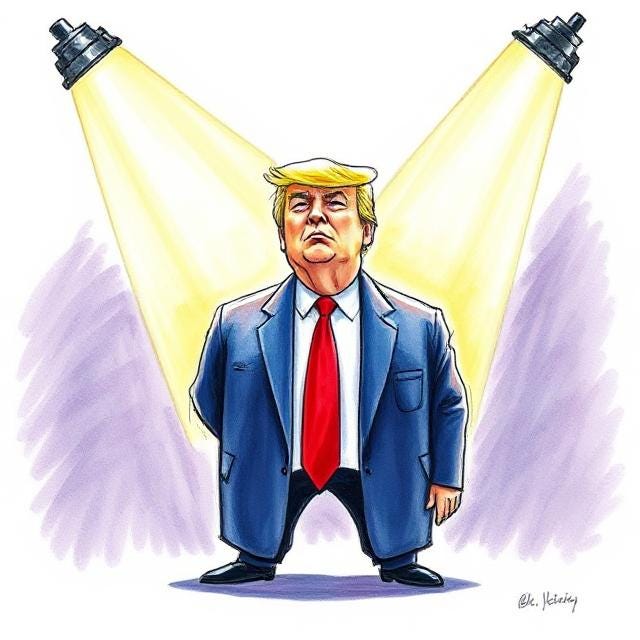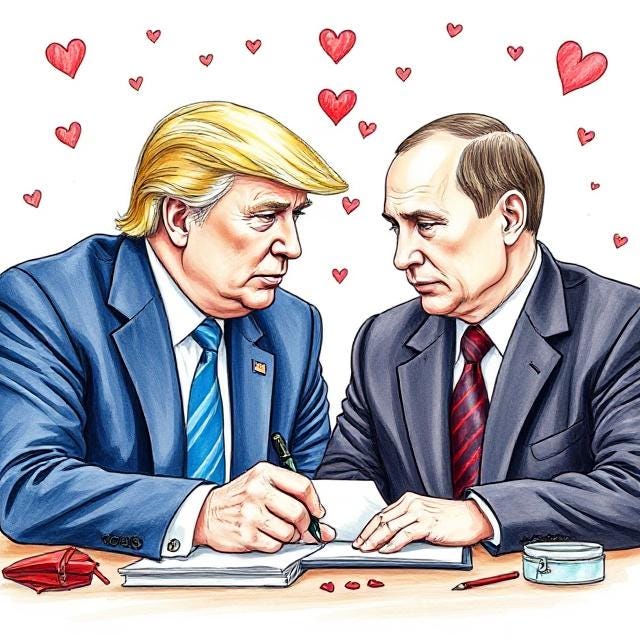Out Trumped
How to meet the Donald, and how not to
Starmer is finally hitting his stride. He seems to have learnt that the best Prime Ministers don’t try to please everyone. In bulldozing planning legislation to enable more house building and infrastructure, he’s annoyed the older, right-wing NIMBYs but will see huge dividends in economic growth, jobs and homes.
And this week, he’s cut foreign aid to increase defence spending. This time, he’s pissing off the more left-wing, younger cohorts - but he’s also made the right decision in an increasingly perilous world. Foreign aid buys us soft power and makes the world a better place, but it is also undoubtedly poorly allocated. Tightening the purse strings will focus minds and ensure money goes where it is needed.
It all contributed to a bump in Starmer’s popularity, according to one pollster.
And, in what was probably his best day as PM to date, he was lavished with praise by the notoriously fiddly President Trump in the White House on Thursday.
Starmer’s ambition was to recreate le bromance we’d witnessed between Trump and Macron earlier in the week. The French and American leaders were touchy-touchy, giggling together and complimenting one another. The stand-out moment, and one that brought Macron heaps of kudos, was when he gently corrected the President: “No, in fact, to be frank,” he interrupted the President to get the facts straight on Europe’s money into Ukraine. "We paid 60 percent of the total effort and it was – like the US – loans, guarantees, grants."
Trump laughed and seemed to accept - if not, at least tolerate - the correction.
Starmer took Macron’s recipe for success and copied it with even more flourish. A letter from the King inviting Trump to a state visit was a nice touch, but Starmer’s emphasis that it was “truly historic” and “unprecedented” really pricked Trump’s ears. Macron and Starmer both seem to have figured out the key to unlock Trump: make him feel like a special little boy.
And Starmer even managed to stand up for himself, just as Macron did, when JD Vance accused Britain of stifling free speech. “We’ve had free speech for a very, very long time in the United Kingdom and it will last for a very, very long time.”
Hogging the limelight
There’s been a material shift in Trump between his two presidencies. He is still brutish, insensitive and coarse. But he’s somehow captured something: while he once got the ire of even Conservative Ministers, today he seems to be a figure of admiration for politicians of all stripes, entrepreneurs and tech bros. They want him on their side. Since the assassination attempt against him, something seemed to change. He became just a little more statesmanlike, seemed to cool his language a little bit, he cut out a lot of the locker room speech.
Another big change: he used to want all the attention. He hated anyone that stole the limelight, and would fire those that rose above their station. Mike Pence, during Trump’s last term, was seen but not heard.
This time around, Trump seems to be happier with his allies piping up. He doesn’t seem to be affected by Elon Musk running press conferences in the Oval Office and being called the real President. He doesn’t seem to take issue with JD Vance becoming a political star in his own right. He seems to be more open to sharing the limelight.
He’s even stopped that bizarre practice of yanking on world leaders’ hands.
Trump, it seems, has now matured to the level most people reach around the age of 8 or 9. He’s become comfortable sharing the limelight and letting others speak, too.
But he’s still not a grown-up, as his meeting with Zelensky showed.
Russian roulette
On Ukraine and Russia, Trump has miscalculated on two fronts.
First, he believes that his base hates Zelensky. He and his allies criticised US aid to Ukraine again and again during the campaign trail, and people ate it up. But in reality, only a quarter of Americans think the US is providing too much aid - and even among Trump voters, it is still a minority that actively wants to slow down aid into the country.
This is a population, remember, where the mainstream media has been built on the idea of Russia as enemy number one for decades. In just about every film, TV show and media outlet since the start of the Cold War, Russians have been the enemy, the terrorists, the attackers. Trump has an unusual affinity for Putin: Americans don’t.
Republicans will continue to follow their supreme leader and election leader to the hilt, for now, but if Trump continues to pick Putin over Europe, this will become a fracture point in his support.
But secondly, and far more importantly, Trump has miscalculated geopolitically. Trump believes that the war continuing brings a greater risk of World War 3, and a peace deal neutralises that risk. He is wrong.
Vladimir Putin has signed a peace treaty with Ukraine before. Russia more or less wrote the Minsk agreements that ended their invasion of the Donbas in 2014. A ceasefire was part of the deal. 8 years later, Putin walked back on the agreement: leading to the far bloodier war we now face.
Should Trump and Putin agree to a peace deal, Putin will start thinking within hours about how and when to breach it. Putin does not want peace: he wants Ukraine. If their deal is not backed up by American force, Putin will invade again: and America will be forced to decide what to do. If this unfolds, it will be the most precarious moment in American-Russian relations since the Cold War.
Zelensky has not been an angel and has lost his touch for diplomacy when it comes to Trump. He should’ve known better than to campaign with the Democrats at the last election. He took the bait from JD Vance during their meeting, trying to create the high-risk Starmer/Macron “to be frank” moment. But Zelensky is right not to back down to America.
Trump’s political lighthouse, Steve Bannon, ultimately views Russia as an ally. Bannon and Trump may not be the buddies they weren’t were, but Bannon still shapes the Maga viewpoint more than perhaps many realise. And if the Maga position is that Russia is a friend, they are prepared to throw Ukraine under the bus to build that friendship. That position, though, is a mistake. Russia is not a friend of the West under its current regime.
Trump may return to the negotiating table, or he may lose interest. He may realise that, domestically, it is not helping him as much as - say - mass-deportations or renaming bodies of water. Trump, after all, is most interested in putting on a show.
“The Trump administration is a soap opera. The president is the producer and the star, responsible for the plot lines, the script, and the cast... If a plot line works, such as a drive for a Nobel-Prize winning peace deal, then it will be developed and might run for many episodes. Otherwise it will be quietly dropped, or may just peter out. The purpose of every episode is to demonstrate the star’s brilliance.”
Laurence Freedman



